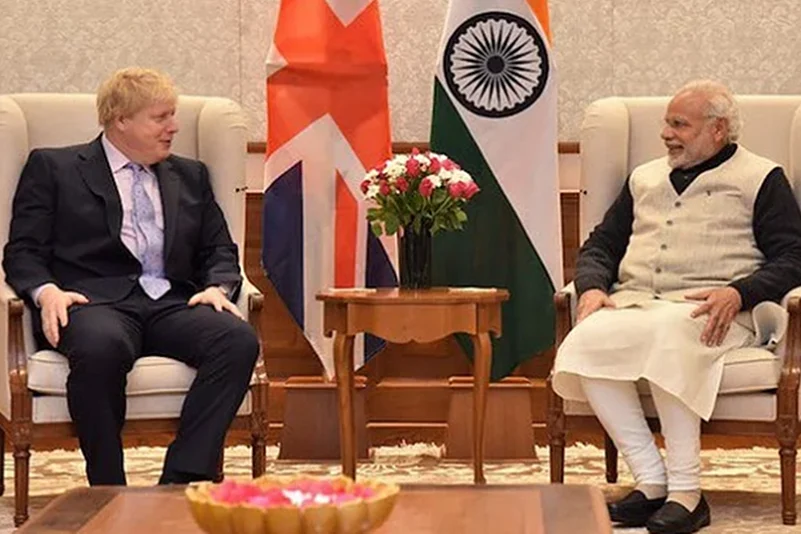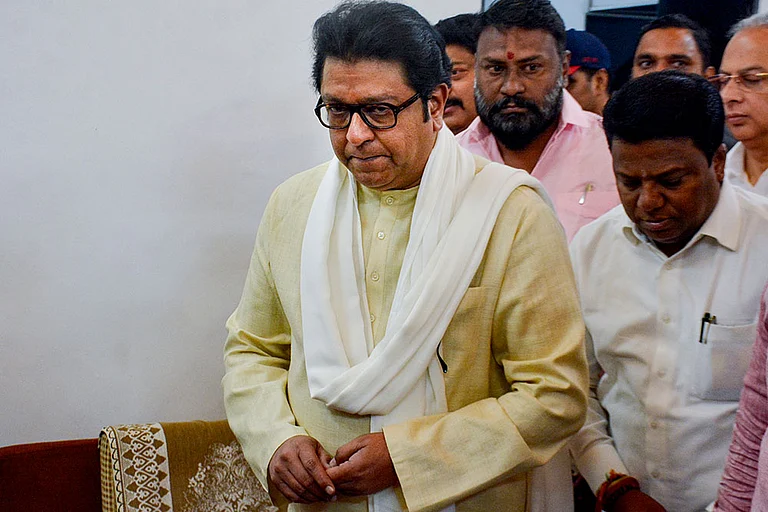The Indian High Commission in London on Thursday said that British Prime Minister Boris Johnson will visit India from April 25 and is set to agree on a 'Roadmap 2030' for re-energised India-UK relations in areas like trade, investment, defence and security cooperation, healthcare and climate action,
Due to the COVID-19 pandemic crisis in India, Johnson has decided to shorten the length of his planned visit – with the bulk of the programme now set to take place during the course of Monday, April 26, said Downing Street on Wednesday.
The visit, previously postponed from a Republic Day tour in January, is the first major bilateral visit for Johnson outside Europe since the UK general election in December 2019 and the conclusion of the Brexit transition period at the end of December 2020.
"The visit of Prime Minister Johnson is expected to positively transform the partnership across the wide-spectrum of issues and areas relating to defence and security, the Indo-Pacific and Western Indian Ocean Region (WIOR), trade and investments, healthcare, climate change and people-to-people connect," the High Commission of India said.
"India and UK are set to agree on a ‘Roadmap 2030’ for future relations. The 2030 vision is for revitalised and dynamic connect between people; re-energised trade, investment and technological collaboration; enhanced defence and security cooperation and closer engagement on regional issues – Including the Indian Ocean Region and the Indo-Pacific.
"The India-UK Partnership in Climate Action, clean energy and health care is geared for mutual benefit and a better world,” it adds.
As part of the UK’s post-Brexit Global Britain engagement as a non-member of the European Union (EU), all eyes have been on a proposed Enhanced Trade Partnership (ETP) with India which will pave the way for a full-fledged Free Trade Agreement (FTA) in the future.
The ETP was expected to take firm shape during Johnson’s visit this month but it remains to be seen how that progresses given the scaled-back programme.
India-UK successful collaboration in the COVID-19 mitigation efforts over the last year has emerged as the silver lining in the bilateral relationship.
Building upon the success achieved in the joint development, manufacture and distribution of the Oxford/AstraZeneca vaccine, the visit will provide an opportunity to further consolidate the India-UK joint partnership in addressing future pandemics through health infrastructure development, joint investment in research and development of vaccines, swifter exchanges of healthcare professionals and strengthening existing institutional links/partnerships in the health sector.
The last bilateral visit by a British Prime Minister to India took place in November 2016 when Theresa May met Prime Minister Narendra Modi for talks, a visit widely seen as unsuccessful largely from the point of view of Britain’s perceived unwelcome visa stance towards Indian students and professionals at the time.
Johnson’s visit, which has been repeatedly hit by COVID-19 pandemic constraints, is by contrast expected to deliver a "streamlined and liberalised regime" for the flow of people between the two countries.
Downing Street is yet to reveal a detailed itinerary of Johnson's truncated agenda but confirmed on Wednesday that it will include a bilateral meeting with Prime Minister Modi and high-level ministerial as well as business talks.
"This programme will be focused on high level discussions with the Indian government and Indian business leaders. We’ll set out more details in due course, but the visit will include a bilateral meeting with Prime Minister Modi," Johnson’s spokesperson at 10 Downing Street said.
The spokesperson said the Prime Minister took the decision to reduce the length of the visit to a shorter programme in New Delhi in light of the COVID situation in India and following discussions with the Indian government.
"As with all the Prime Minister’s visits, his trip to India will prioritise the safety of those involved. All elements of the visit will be Covid secure,” the spokesperson said.
The 56-year-old UK prime minister is himself a COVID-19 survivor. In April, Johnson spent three nights in intensive care at a London hospital before being discharged.
Johnson's visit comes in the wake of the UK’s foreign policy vision for an Indo-Pacific tilt as part of its “once-in-a-generation” Integrated Review released last month, with the India visit highlighted as a central plank of that strategy during its launch in the House of Commons.
The publication of the review came amid growing pressure on the government to harden its line on an assertive China over issues such as its clampdown on Uyghur Muslims in Xinjiang and democratic rights in Hong Kong.
(With PTI inputs.)

























